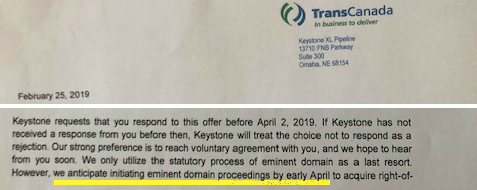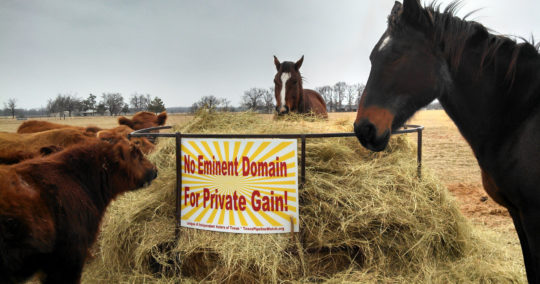

Nebraska landowners on the proposed Keystone XL route who have not signed easement contracts to sell their land for the pipeline received letters in February, threatening that TransCanada would take them to court and sue to take their land via eminent domain if they did not “respond to this offer before April 2” — even though TransCanada has NO eminent domain authority in the state of Nebraska.
TransCanada currently has no approved route through Nebraska for KXL — the only vehicle under state law through which it could be vested with the power of eminent domain. The Nebraska Supreme Court is currently deciding on a challenge to the route brought by landowners after the Public Service Commission approved a “Mainline Alternative” route in 2017.
The controversial route choice was challenged in court on the basis that it that had undergone almost no review, and affected landowners had no opportunity or due process to object. Nebraska statute dictates TransCanada must go back and file a new application and undergo the full Intervenor process and review for this route.
While the Nebraska Supreme Court considers the case, TransCanada has no route, and in turn no claim to eminent domain authority to be threatening landowners with in Nebraska, to pressure them into signing deals to sell land that has been in their families for generations to a risky tarsands export pipeline.
TransCanada has been engaging in this behavior — issuing false and misleading claims to landowners in Nebraska and across the proposed route, for almost a decade now.
TransCanada Easement Letter February 25 2019
In addition to empty eminent domain threats, TransCanada has also been bullying landowners with letters sent to their local banks — without any outreach to the landowners themselves — seeking “subordination” agreements with the landonwers’ banks.
TransCanada wants the subordination agreements so that the pipeline company would be the first in line to collect if any subcontractor they hire does shoddy work or goes bankrupt, and then lawsuits are filed back and forth between TransCanada and these companies. Meanwhile, the landowner faces the prospect of a lien on their bank note and the added stress on the mortgage they are managing on their farms and ranches (this just happened with TransCanada and Keystone XL proposed route landowners in Meade County, South Dakota; see Rapid City Journal excerpt below).
TransCanada Subordination Letter
Excerpted from the Rapid City Journal, March 31 story:
“Landowners hit with $1 million in liens during Keystone XL road dispute”
“When Rod Ingalls opened his letter, he “just about fainted.”
When Lyle Weiss opened his, he “couldn’t believe it.” JT Vig got “fuming mad.”
“It’s a good thing they weren’t standing there,” Vig said of the letter’s senders, “because I might’ve clocked them.”
The letters arrived earlier this month. They said mechanic’s liens had been filed against each rancher’s land by Brandenburg Drainage, of Maquoketa, Iowa. In all, Brandenburg filed 23 liens totaling $1.01 million against Meade County landowners in mid-March…
Frank Falen, an attorney from Cheyenne, Wyoming, who is working with some of the landowners, said if TransCanada or the landowners think the liens were filed improperly, they could take legal action against Brandenburg Drainage.
“We’re not convinced that what the subcontractor has done in this instance is appropriate,” Falen said. The biggest lien, for nearly $244,000, is against Lyle Weiss, who happens to own the biggest stretches of land along Maurine Road. His lien was not among the seven that were released Wednesday, and his patience was growing thin as he speculated about the potential impact of the lien on the operating note for his ranch.
“They’re messing with our livelihood,” Weiss said.



